OUR SERVICES
Preventive Dentistry In Dumont
Dental Exams and Cleanings in Dumont
Prophy and Perio Maintenance
In order to maintain great oral health, you need to brush your teeth at least twice a day, floss once a day, and visit your dentist twice a year for a routine exam and teeth-cleaning.
But some patients might need a little more help. That’s why the team at Palisades Dental Care offers dental prophylaxis and periodontal maintenance, which can help patients who want to maintain healthy teeth and gums when they’ve had issues with periodontal disease.
Dental prophylaxis and periodontal maintenance — sometimes called prophy and perio — are very similar procedures, but there are some distinct differences between the two. Both work to clean the teeth and gums by removing disease-causing bacteria. Prophylaxis is more of a preventative procedure, while periodontal maintenance seeks to treat diagnosed periodontal disease.
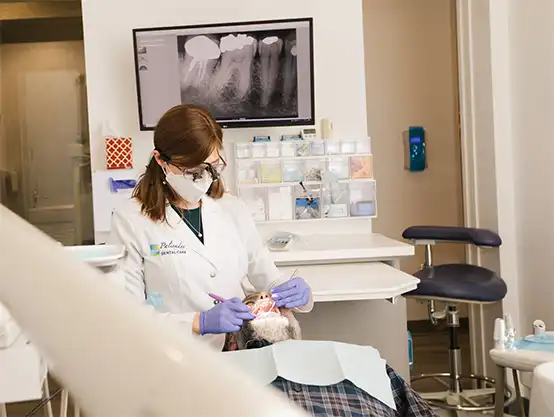
To get a better idea of the major differences between dental prophylaxis and periodontal maintenance, let’s take a closer look at each of them.
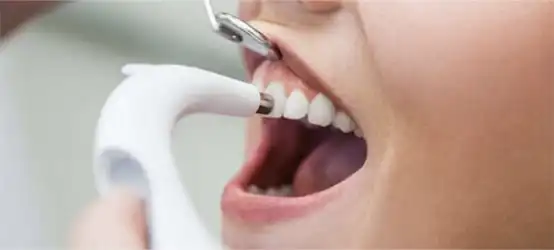
Dental Prophylaxis
The best way to make sure that you maintain great oral health is to be proactive in preventing issues like tooth decay and gum disease. Schedule an appointment with your dentist for an oral health check-up and a teeth cleaning, which can help to catch any developing issues and stop them in their tracks early on.
Dental prophylaxis is a way to simply and quickly clean your teeth. It includes an inspection of your mouth for signs of cavities, gum disease, and other potential oral health issues.
The Dental Prophylaxis Procedure
When you visit your dentist for a dental prophylaxis procedure, you can expect the following:
- Update of your medical history
- Oral cancer screening
- Periodontal probing
- Dental cleaning
- Oral examination
- X-rays (if necessary)
- Scaling
Your dental cleaning will include special tools used to remove bacteria, plaque, and tartar above the gum line. This process is known as scaling.
After the scaling procedure, your dentist will clean your teeth to remove any stains.
Periodontal Maintenance Near You
Your dentist might recommend periodontal maintenance if you are currently suffering from gum disease or if your gums have previously been infected. If left untreated, gum disease can cause a wide array of issues with your oral health, as well as your overall health.
- Sore gums
- Difficulty chewing
- Sensitive teeth
- Loose teeth
- Bleeding gums
- Bad breath (halitosis)
- Receding gums
- Tooth loss
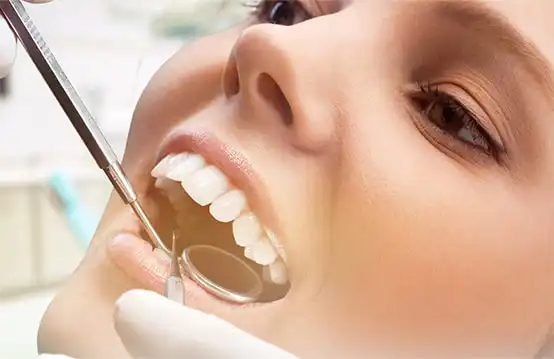
These are not the only issues that are connected to periodontal disease. Studies have shown a connection between gum disease and arthritis, diabetes, heart disease, stroke, and more. While this information may be alarming, treatment for gum disease is often as simple as regularly seeing your dentist for routine periodontal maintenance.
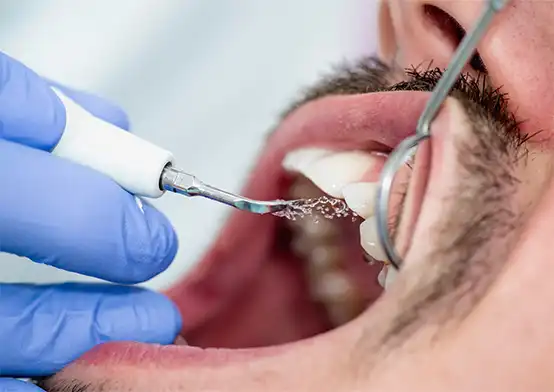
The Periodontal Maintenance Procedure
The procedure for periodontal maintenance is very similar to that of dental prophylaxis. Both involve the removal of bacteria, plaque, and tartar through the process of scaling. The big difference is that periodontal maintenance requires a deeper and more meticulous cleaning.
After a thorough scaling above and below the gum line, your dentist will do what’s known as root planing, a process that’s used to smooth out the roots of your teeth in order to clear out bacteria, reduce gum inflammation, and promote reattachment of gum tissue to the teeth.
While gum disease is quite easily treated, it is considered to be a chronic condition, meaning that it is never truly cured. You will need to have continued periodontal maintenance in order to keep it in check.
It’s recommended that patients with gum disease see their dentist every three or four months for a cleaning and check-up. This will make sure that the disease doesn’t have the opportunity to progress and cause more serious health issues down the line.
The Periodontal Maintenance Procedure
As you can see, the distinction between prophylaxis and periodontal maintenance is primarily related to whether a patient suffers from gum disease or not. If you have been previously diagnosed with gum disease, periodontal maintenance is the appropriate procedure for you. Otherwise, schedule an appointment with your dentist and they will be able to suggest the best options to meet your specific needs.
Periodontal Therapy (Non-Surgical)
Palisades Dental Care offers non-surgical periodontal therapy for patients who suffer from gum disease. Our conservative procedures are intended to provide an easier and less painful alternative to periodontal surgery.
The periodontal therapy process involves scaling and root planing to remove gum-disease causing bacteria, plaque, and tartar, as well as the use of antimicrobial or antibiotic treatments.
If you currently suffer from gum disease, our non-surgical periodontal therapy can help to treat your symptoms. It may even be able to prevent the need for future surgery.
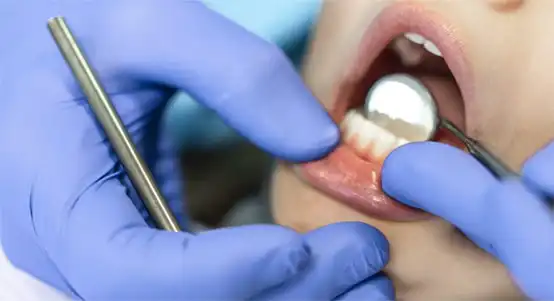
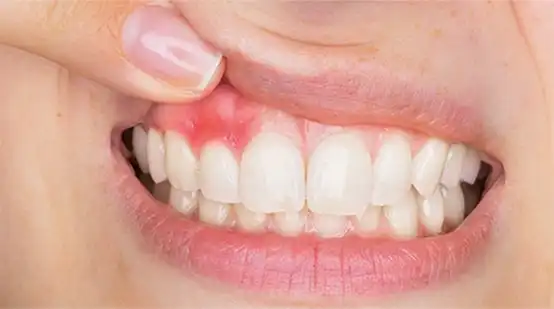
What is Gum Disease?
Gum disease, otherwise known as periodontal disease or periodontitis, is the result of a bacterial infection created by a build-up of plaque and tartar on the teeth and gums. A serious infection can destroy gum tissue, leading to a wide array of issues with your oral and overall health.
Symptoms of gum disease include:
- Sore and bleeding gums
- Tooth sensitivity
- Loose teeth
- Receding gum lines
- Chronic bad breath (halitosis)
- Tooth loss
But that’s not all. Gum disease has also been shown to have a correlation with the following health issues:
- Rheumatoid arthritis
- Heart disease
- Diabetes
- Stroke
It is believed that serious inflammation of the gums — which is a symptom of periodontitis — can eventually affect the bloodstream, leading to damage in the heart and the brain.
Gum disease may be an easy issue to ignore for a while, but its long-term ramifications can be dire, and therefore, it should be taken very seriously. Fortunately, it is highly treatable. Non-surgical procedures are usually enough to keep an infection at bay.
Causes of Periodontal Disease
There are a number of reasons why you might be suffering from periodontitis — some of which may even be outside of your control.
These factors include:
Stress: Stress weakens your immune system, making your body prone to infections of all kinds, including gum disease.
Tobacco Use: Tobacco is not only believed to cause an array of serious illnesses like cancer and heart disease, but it’s also been linked to gum disease. Chewing tobacco use has been found to increase the risk of developing periodontitis, as well.
Hormonal Changes: Any sort of shift in your body’s production of hormones — be it through pregnancy, puberty, or anything else — can increase the risk of developing periodontal disease or worsen the symptoms of a pre-existing infection.
Certain Medications : There are a few different medications that are known to be connected to periodontitis, including certain antidepressants, heart medications, and oral contraceptives.
Diabetes: Diabetes makes it difficult for your body to stave off an infection. Therefore, anyone with diabetes is at a higher risk of developing periodontitis.
The Periodontal Therapy Procedure
If you suffer from any of the conditions listed above, you may be in need of periodontal therapy. Schedule an appointment with Palisades Dental Care to get a proper, full diagnosis and discuss appropriate treatments.
Oftentimes, a non-surgical periodontal therapy procedure will be suggested to treat your periodontitis.
Non-surgical periodontal therapy generally consists of the following steps:
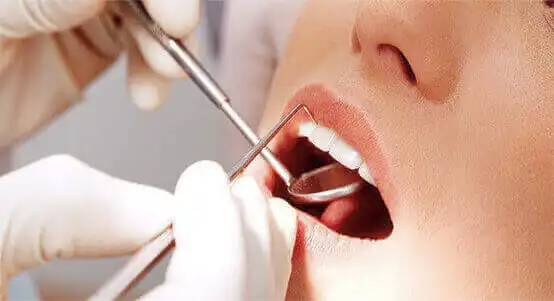
Scaling and Root Planing
Scaling is a gentle, but thorough cleaning of the areas above and below your gum line. Special scaling tools are used to remove disease-causing bacteria, plaque, and tartar, particularly from areas that can’t easily be reached by a tooth brush or floss.
Clearing out plaque and tartar from these hard-to-reach areas will allow the root planing process to take place. Root planing involves smoothing out the tooth root so that gum tissue can reattach to the tooth, providing greater protection and less surface area for plaque and tartar to build up.
This process is key to preventing the infection from spreading further or causing tooth loss.
A local anesthetic is applied prior to a scaling and root planing procedure, ensuring that the process is as comfortable and pain-free as possible.
Antimicrobials and Antibiotics
Sometimes, a scaling and root planing procedure is not enough to treat periodontitis. In these instances, your dentist will likely recommend the use of antimicrobials or antibiotics. These treatments are intended to fight plaque and bacteria in order to heal your gum tissue.
Antimicrobials can come in the form of mouth rinses or a gel that can be applied directly to your gums, while antibiotics will generally be prescribed to you and taken orally in conjunction with regular visits to your dentist for periodontal therapy treatments.
In Need of Periodontal Therapy in Dumont?
Palisades Dental Care can help! Reach out to our skilled team members to book your appointment today.
Palisades Dental Care
The dream is now real, living, breathing.
Come and see. I can’t wait to meet you.

